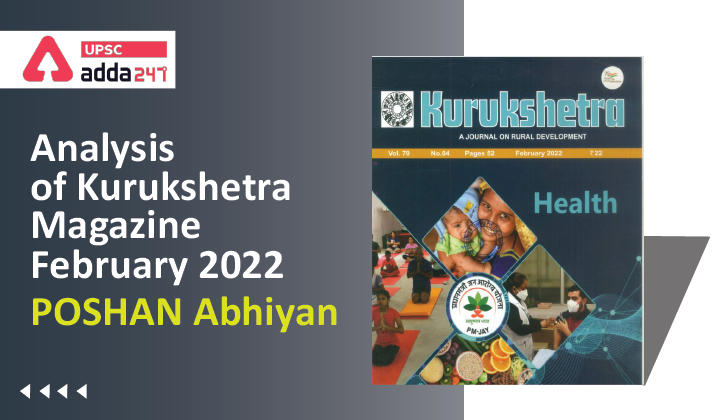Table of Contents
Analysis of Kurukshetra Magazine(February 2022): ”POSHAN Abhiyan”
”GS 2: Welfare Schemes, Issues Related to Children, Issues Related to Women”
Introduction
- Empowerment and protection of women and children who constitute 67.7% of India’s population and ensuring their wholesome development in a safe and secure environment are crucial for the sustainable and equitable development of the country and for achieving transformational economic and social changes.
- Maternal malnutrition is still a global problem, with 24 per cent of mothers in South Asia having a low BMI.
- Furthermore, anaemia affects 30 per cent of reproductive-age women and 37 per cent of pregnant women. Women’s communication, community engagement, overweight/obesity is growing problem in low-middle-income nations.
What is POSHAN Scheme?
- The Prime Minister’s Overarching Scheme for Holistic Nutrition or POSHAN Abhiyaan or National Nutrition Mission is the Government of India’s flagship programme to improve nutritional outcomes for children, pregnant women and lactating mothers.
- Launched by the Prime Minister on the occasion of the International Women’s Day on 8 March 2018 from Jhunjhunu in Rajasthan, the POSHAN directs the attention of the country towards the problem of malnutrition and address it in a mission mode.
Role of NITI Aayog in shaping the POSHAN Abhiyan
- It has played a critical role in shaping the POSHAN Abhiyaan.
- The National Nutrition Strategy, released by NITI Aayog in September 2017 presented a microanalysis of the problems persisting within this area and chalked out an in-depth strategy for course correction.
- Most of the recommendations presented in the Strategy document have been subsumed within the design of the POSHAN Abhiyaan and now that the Abhiyaan is launched, NITI Aayog has been entrusted with the task of closely monitoring the POSHAN Abhiyaan and undertaking periodic evaluations.
Aim of POSHAN Abhiyan
- POSHAN Abhiyaan, India’s flagship National Nutrition Mission, aims to enhance maternal nutrition by employing technology, behaviour change communication, community engagement, and cross-sectoral convergence.
- In India, there are a variety of programmes and policies in place to improve maternal diets, including take-home rations and hot cooked meals for pregnant and lactating women, micronutrient supplements, food fortification, and delivery of subsidised staples through the Public Distribution System, cash transfers, nutrition-sensitive agriculture, diet education and counseling.
- With the overarching aim to build a people’s movement (Jan Andolan) around malnutrition, POSHAN Abhiyaan intends to significantly reduce malnutrition in the next three years.
The four-point strategy
For the implementation of POSHAN Abhiyaan the four-point strategy/pillars of the mission are:
- Inter-sectoral convergence for better service delivery
- Use of technology (ICT) for real-time growth monitoring and tracking of women and children
- Intensified health and nutrition services for the first 1000 days
- Jan Andolan
Mission POSHAN 2.0
- It is an Integrated Nutrition Support Programme.
- It seeks to address the challenges of malnutrition in children, adolescent girls, pregnant women and lactating mothers through a strategic shift in nutrition content and delivery and by the creation of a convergent eco-system to develop and promote practices that nurture health, wellness and immunity.
- Poshan 2.0 seek to optimize the quality and delivery of food under the Supplementary Nutrition Program.
- Mission Poshan 2.0 contribute to the human capital development of the country; address malnutrition challenges; promote nutrition awareness and good eating habits for sustainable health & well-being and address nutrition-related deficiencies through key strategies.
- Under the programme, nutritional norms and standards and quality and testing of THR will be improved and greater stakeholder and beneficiary participation will be promoted besides traditional community food habits.
- Poshan 2.0 brought 3 important programmes/schemes under its ambit, viz., Anganwadi Services, Scheme for Adolescent Girls and Poshan Abhiyaan.
What can India do to improve the nutrition and wellbeing of mothers and children in society?

Policy Strengthening
-
- Adopting and adapting evidence-based success stories in regions that need more support Using financial levers for maximum impact.
- Restricting advertising and marketing of unhealthy and unsustainable foods targeted towards children, youth and other vulnerable groups.
- Applying effective and efficient food labelling laws and regulations
- Push for agricultural policies emphasising quality, nutritious and sustainable food production practices rather than concentrating only on producing greater quantities of food.
- Urgently investing in public policies and innovations that will reduce food loss and food waste.
- Demonstrating leadership and commitment to ensure coherent food system actions.
Improve Education, Research and their Dissemination
-
- Address logistic Challenges.
- Vacancies and manpower.
- Fund utilisation.
- Better planning and maximal use of data being collected under national programs and schemes.
- Improved monitoring and surveillance with the use of technology must be effectively implemented.


 TSPSC Group 1 Question Paper 2024, Downl...
TSPSC Group 1 Question Paper 2024, Downl...
 TSPSC Group 1 Answer key 2024 Out, Downl...
TSPSC Group 1 Answer key 2024 Out, Downl...
 Cabinet Ministers of India 2024, New Cab...
Cabinet Ministers of India 2024, New Cab...







